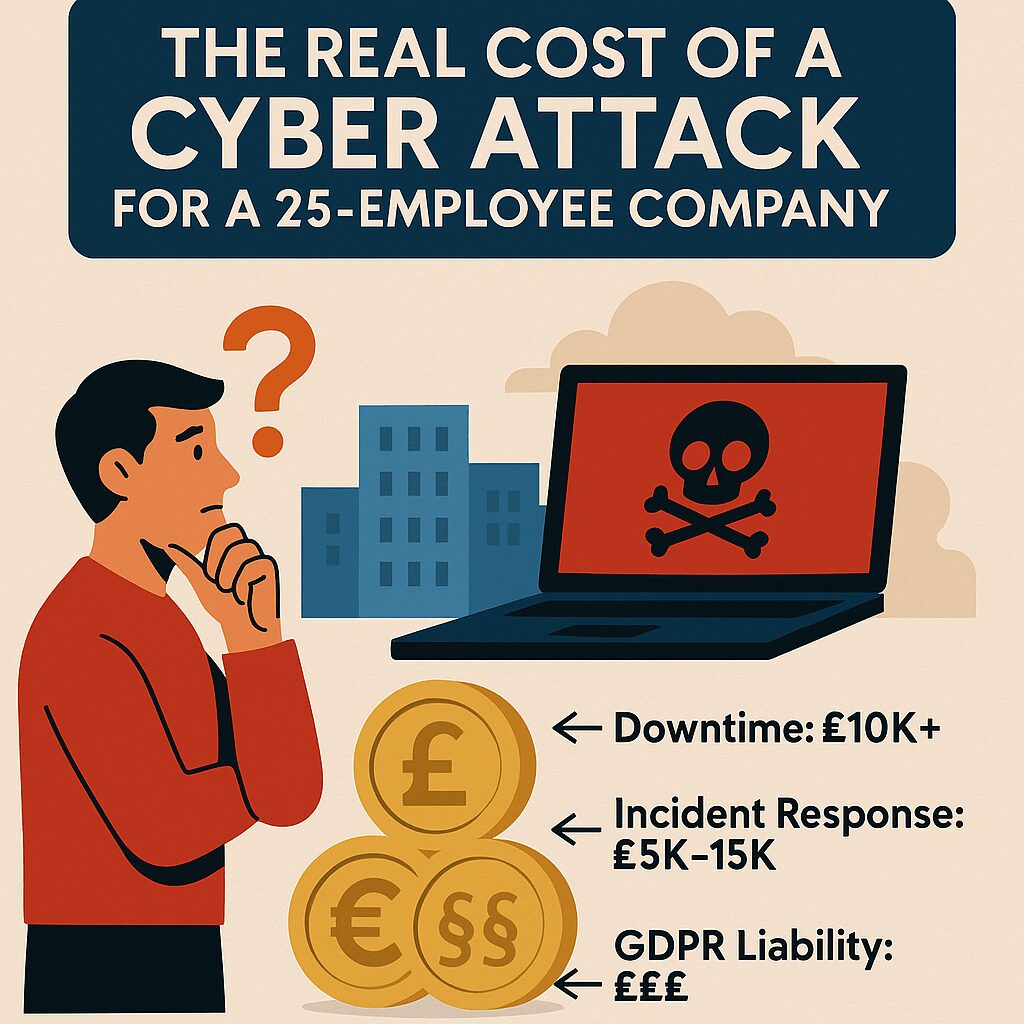Think You Can Afford a Cyber Attack? Think Again.
Most UK SMEs underestimate the damage a cyber attack can cause. Many believe it’s an inconvenience, a temporary problem easily solved.
The truth is, a single breach can cost tens of thousands of pounds, even for a business with just 25 employees.
In this post, we break down the true costs of a cyber attack on a UK SME, based on real data, incident case studies, and industry insights.
📊 Breakdown of a Realistic SME Cyber Attack Scenario
Let’s consider a 25-person business in Manchester. Their setup:
- Microsoft 365 email system
- No cyber awareness training
- Antivirus only (no MDR)
- No Cyber Essentials or ISO 27001 certification
Here’s how the costs break down after a ransomware attack:

🔒 1. Operational Downtime (£10,000+)
- 3 days of full system lockout
- 20 staff unable to work properly
- Productivity hit and missed client deadlines
At an average billing rate of £250/day per staff member, that’s over £10,000 in lost time.
🧑💻 2. Incident Response & Forensics (£5,000–£15,000)
- Hiring emergency IT experts
- Analysing how the breach happened
- Restoring systems and checking backups
Typical rates are £150–£300/hr, and response takes days.
📢 3. Notification & Communication (£2,000+)
- Notifying customers and partners
- Legal fees to draft GDPR-compliant communications
- PR efforts to protect your reputation
⚖️ 4. Potential GDPR Fines (Varies)
If personal data was involved, the ICO may fine up to £17.5 million or 4% of annual turnover.
Even if a fine is avoided, regulatory scrutiny can result in mandatory audits and increased insurance premiums.
🤝 5. Lost Clients or Contracts (£5,000–£20,000+)
Trust is hard to regain. After a data breach, many clients take their business elsewhere.
- Lost contracts
- Cancelled renewals
- Negative online reviews
Even losing one long-term client could mean £10,000 in lost revenue.
💸 Total Estimated Cost: £30,000–£50,000+
And this is for a single incident.
If the business had had basic protections in place—like MDR and awareness training—many of these costs could’ve been avoided entirely.
🤔 Why Are SMEs So Vulnerable?
- Limited in-house IT staff
- No dedicated security budget
- Reliance on basic antivirus or off-the-shelf tools
Yet attackers are increasingly automating attacks that scan for small business weaknesses—especially open remote desktop ports, unpatched software, or untrained staff.
🛡️ How to Prevent This Outcome
The good news is, robust protection is affordable.
Step 1: 24/7 Managed Detection & Response (MDR)
- Detects and neutralises threats in real time
- Stops ransomware, phishing, and brute force attacks
- From £5/user/month
Step 2: Cyber Security Awareness Training
- Trains staff to identify phishing and unsafe behaviour
- Includes unlimited simulations
- £5/user/month
Step 3: Regular Vulnerability Assessments
- Finds gaps before hackers do
- Helps with compliance
🎁 Free Cyber Risk Review
We offer free cyber security posture reviews tailored for SMEs. We’ll evaluate your current risk level and recommend cost-effective solutions.
👉 Claim Your Free Risk Review


